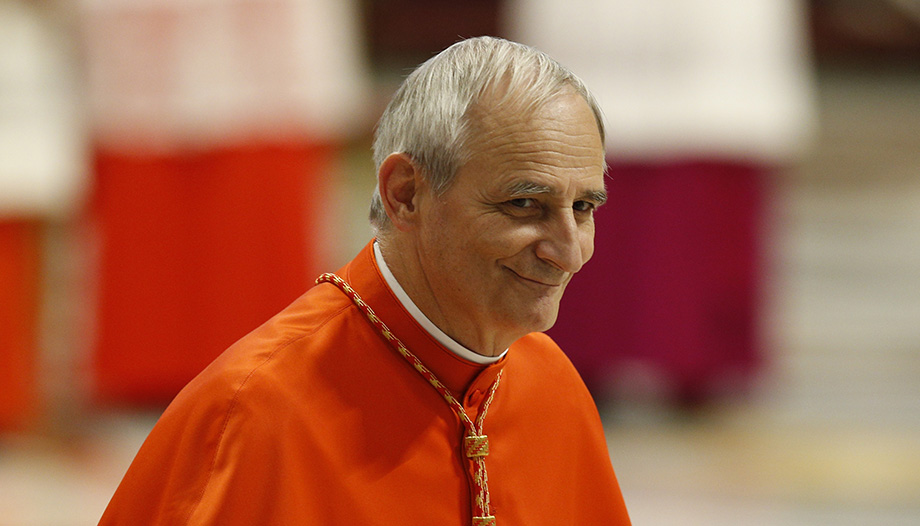The choice was made immediately after the general assembly of the Italian Bishops' Conference transmitted to Santa Marta the results of the morning vote: Zuppi was the most voted candidate of the trio to be presented to the pontiff, followed by Cardinal Paolo Lojudice of Siena and Monsignor Antonino Raspanti, Bishop of Acireale.
The announcement was made by Cardinal Gualtiero Bassetti, outgoing president, to the applause of the audience gathered at the Hilton Rome Airport in Fiumicino.
It was the Pope himself, a few days earlier, who outlined the profile of the new president in an interview with the director of Corriere della Sera, Luciano Fontana: "I try to find one who wants to make a good change. I prefer a cardinal, who has authority".
The two most authoritative candidates seemed from the beginning to be Zuppi and Lojudice, both highly esteemed and "priests of the street," as Bergoglio likes, with long experience among the poorest and the last. Francis is not bound by preferences, but in the end, as happened with Bassetti in 2017, he appointed the candidate most voted by the assembly.
Zuppi joked a few days ago about being given as a favorite: "Cardinal Biffi used to say that only crazy people want to be bishops, you could say that the craziest people want to be heads of bishops. The bishops should point to someone they think will bring unity and will be able to represent them all, helping the Italian Church to continue the path of the last decades and the synodal journey begun last year. Let's see what the bishops decide in the trio that they will indicate to the Pope and what the Pope will decide."
Zuppi's first words as IEC President
"Communion and mission are the words I feel in my heart. I will try to do my best, let us remain united in synodality". These are the first public words of the new president who, in yesterday afternoon's press conference, stressed: "This trust of the Pope who presides in charity with his primacy, and of the collegiality of the bishops, together with synodality, is the Church. And these three dynamics are the ones that will accompany me and for which I feel so much responsibility".
For the cardinal, the Church must be on the move. "The mission is the same as always: the Church that speaks to everyone and addresses everyone," he explains. "The Church that is in the street and walks, the Church that speaks only one language, the language of love, in the babel of this world."
Zuppi mentions the moment we live in, marked by "pandemics". That of Covid, first, "with the conscience and dissidence it has revealed and provoked", and now the "pandemic of war" in Ukraine, without forgetting "all the other pieces of the other wars".
The thought then turns to his predecessors at the head of the Italian Episcopal Conference: Antonio Poma, Ugo Poletti, Camillo Ruini and Angelo Bagnasco, and finally to Gualtiero Bassetti "who in these years with such paternity and friendship has led the Italian Church, creating so much fraternity that I have enjoyed as a bishop".
The last thought is for the Madonna of St. Luke, which is celebrated in Bologna on May 24, the day of his election: "I place everything in your hands and I ask you to accompany me and us on this journey of the Italian Church".
Cardinal Zuppi, of Roman origin, comes from the Sant'Egidio community: in 1973, as a student at the Virgilio classical high school, he met the founder Andrea Riccardi. From that moment on, he became involved in the various activities of the community, from the popular schools for marginalized children in the slums of Rome, to initiatives for the elderly alone and not self-sufficient, for immigrants and the homeless, the terminally ill and nomads, the disabled and drug addicts, prisoners and victims of conflicts.
A graduate in Literature and Philosophy from the University of La Sapienza, he graduated in Theology from the Pontifical Lateran University. For ten years he was parish priest of the Roman basilica of Santa Maria in Trastevere and general ecclesiastical assistant to the community of Sant'Egidio: he was mediator in Mozambique in the process that led to peace after more than seventeen years of bloody civil war.
In 2012, after two years as parish priest in Torre Angela, Benedict XVI appointed him auxiliary bishop of Rome. Francis elected him archbishop of Bologna in October 2015 and four years later, on October 5, 2019, created him a cardinal.
Every injustice produces collective pain
Finally, a brief personal note. I had the good fortune to listen to Zuppi at a meeting promoted by the Iscom Association on the state of the Church in Italy in the first months of the pandemic.
I wrote down some passages which, reread today, seem to indicate the heart of a biography and the outline of a commitment: "It is as if the virus has united us in a "community of destiny", from isolated monads we have become interdependent cells of a single organism. This is not only a problem of hygiene, but also of a spiritual dimension. Man, as Thomas Merton said, is not an island.
What is the most important virtue today? Humility," was Zuppi's answer, "to look to the future, because this pandemic that brought the world to its knees was a great humiliation for all of us. Our parents' generation had the Apocalypse in their heads and in their hearts. I believe that this humility will serve us to understand that we are only okay if others are okay. That all injustice produces a collective pain".
The risk, then, is that injustice will increase even more. Today, differences and inequalities are ever greater, and this weighs on the lives and security of all. "In the spirit of Evangelii Gaudium, we need a missionary Church, with open doors and announcing the joy of the Gospel to all."













